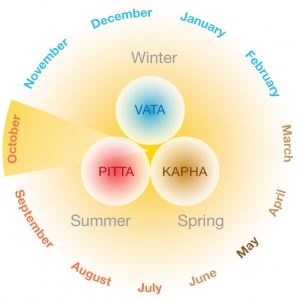This time of year, called “sharad ritu” in Sanskrit, is characterized by an initial increase of Pitta Dosha in the body, followed by Vata Dosha taking over. Skin problems such as herpes are now frequent. Other viral and bacterial infections or diseases come to the fore as well, such as stomach ulcers, inflammation of the oral mucosa, hepatitis, and also chronic intestinal diseases. Following a diet and daily routine appropriate for this time of year is thus crucial for your well-being, more so if one of these imbalances is pre-existing.

Reducing Pitta during the transition period
During this period, the main goal is to reduce the heat which has accumulated in the organism over the summer. Therefore, it is advisable to avoid all hot spices such as chili, paprika, garlic, mustard; also excessive acidity, such as vinegar, soy sauce and gherkins. These foods lead to acidity in the physiology, which contributes to the spread of viruses and bacteria and can thus trigger an infection.
The most important antidote to this is the use of Ghee. In autumn, it is important to add a half to a whole tablespoon to your food every day, especially if your constitution is predominantly Vata. This helps to mitigate excess Pitta Dosha and soothes rising Vata.
In addition to fruits and vegetables, you can eat more raw foods, i.e. more salads, germinated legumes (sprouts), also untreated nuts and dried fruits.
The second important tip is to favor bitter foods such as chicory, spinach, artichokes, or rocket (rucola). Also tart flavor, such as in pomegranate, is helpful to prevent the spread of acidity in body tissues. To more easily reach the recommended daily intake, you can use a food supplement with concentrated bitter substances in liquid form.
When exposed to heat, the body cells produce more acid enzymes. Bitter and pungent products prevent them from entering the bloodstream.
In autumn, Ayurvedic procedures are very useful for cleansing the liver, intestines and blood. They use bitter Ghee and castor oil to remove excess acidity from the body, thus preventing many potential problems that could otherwise come up during this season.
Therefore, it is highly recommended for people with Pitta problems, such as inflammation of the skin, heat in the body, or heartburn, to take a cleansing cure in autumn. For these conditions, autumn is the best time for a Panchakarma course of treatment.
Staying healthy throughout autumn with Ayurveda
As the weather becomes increasingly cool, rough, and windy, Vata Dosha increases gradually. This Dosha is characterized by the qualities subtle, dry, and cool. Just as the wind whirls the leaves around, we can also experience mood swings and turbulence inside. You may notice more nervousness, a restless sleep, dry skin, or a tendency towards a sluggish bowel. The goal now is to soothe Vata Dosha with warmth and security.
With these tips, you can prevent excess Vata:
- Always keep yourself nice and warm and avoid drafts. Keep your hands and feet warm and protect your throat and neck.
- Drink enough hot water throughout the day.
- Start the day with a few gentle yoga exercises. Especially recommended: bending forward and backward, twisting and mobilizing the spine with Asanas like the Cat or Cow, and the Cobra or Camel Asanas. If you are struggling with low blood pressure or a lack of drive in the morning, you can provide the necessary warmth in your body with a few rounds of Sun Salutation.
- In addition, you can add suitable alternating breathing to your yoga routine to establish inner balance.
- Give yourself Abhyanga (oil massage) at least twice a week before showering to nourish your nervous system and body tissues. Suitable oils are cured sesame oil, or for sensitive people Vata oil or almond oil.
- During autumn, your food should be warm, relatively liquid, and nourishing. Well-suited are thus soups, stews, khichari, and curries.
- By the additional use of valuable vegetable oils and Ghee, Vata Dosha can be pacified very well. At the same time, skin and joints are kept supple.
- In autumn, the Doshas can be balanced wonderfully and the immune system strengthened with Rasayanas such as Chyavanprash or Amrit Kalash. Both are available as a paste, but you can also take e.g. Chyavanprash dissolved in warm water or tea.
- In the evening, a warm golden organic milk with turmeric, cinnamon, saffron and a little cardamom can provide relaxation.
In order to get through the transition period in good health and full of energy, it is important to schedule enough time to recuperate. Make sure to include breaks with active relaxation, such as meditation or breathing exercises, and go to bed early if you can. In this way you are giving your nervous system frequent opportunities to regenerate. Light exercise units provide the necessary energy boost, generate warmth, and activate your physiology. The key to well-being, especially in autumn, is to have balanced and adequate amounts of activity and rest.
© Maharishi Ayurveda Privatklinik Bad Ems
Download this article as a PDF file
Thank you for good suggestions!